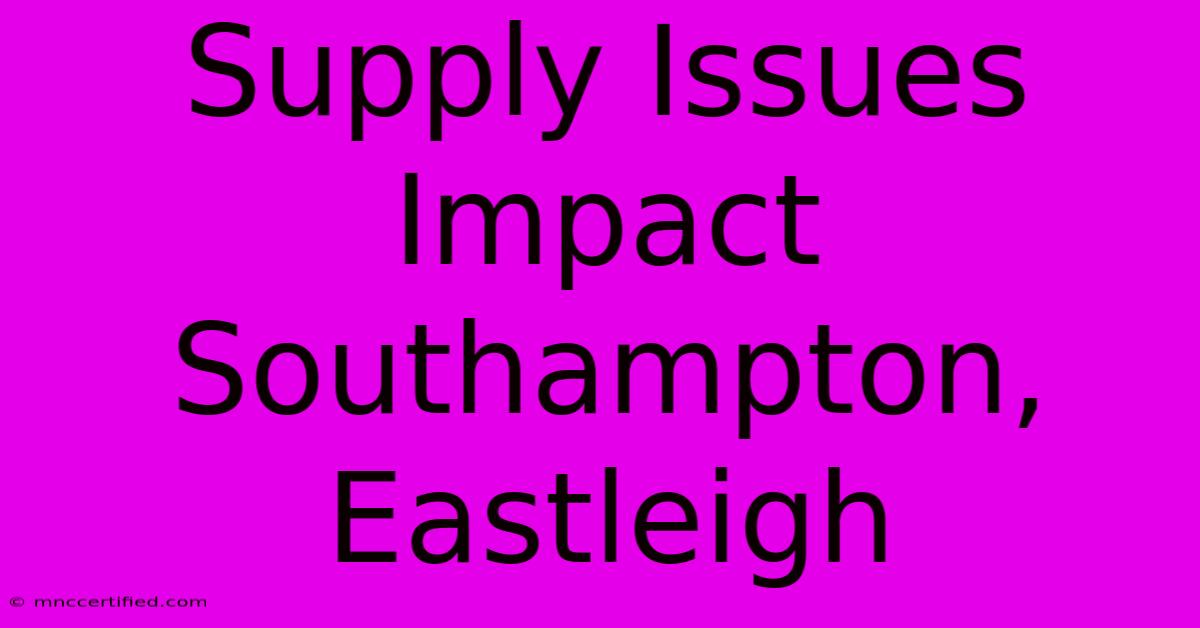Supply Issues Impact Southampton, Eastleigh

Table of Contents
Supply Issues Impact Southampton and Eastleigh: A Growing Concern
Southampton and Eastleigh, vibrant hubs in Hampshire, are facing increasing challenges due to escalating supply chain issues. This article delves into the specific impacts these disruptions are having on local businesses, residents, and the overall economy of these two closely linked areas. We'll explore the root causes, potential solutions, and the long-term implications for the future.
The Current State of Supply Disruptions
The impact of global supply chain issues is undeniable, and Southampton and Eastleigh are not immune. Businesses across various sectors are experiencing:
-
Increased Costs: The price of raw materials, fuel, and transportation has skyrocketed, leading to higher production costs and, consequently, increased prices for consumers. This is particularly felt in sectors like construction, retail, and hospitality in both Southampton and Eastleigh.
-
Delays in Deliveries: Getting essential goods and materials on time has become a major headache. This affects everything from stocking supermarket shelves to completing construction projects on schedule. The port of Southampton, a crucial gateway for imports and exports, is experiencing its own challenges in handling the increased volume and complexity of global shipping.
-
Shortages of Goods: In some cases, businesses are struggling to source key components or products altogether. This scarcity is leading to empty shelves in stores, delays in service provision, and difficulty in fulfilling customer orders. This is impacting both large businesses and smaller independent retailers in Southampton city centre and Eastleigh town centre.
-
Labour Shortages: The supply chain crisis is also intertwined with labour shortages. Many businesses in Southampton and Eastleigh are struggling to find and retain skilled workers, exacerbating the existing challenges. This affects not only delivery drivers but also skilled tradespeople vital to construction and repair services.
Specific Impacts on Southampton and Eastleigh
The impact on Southampton and Eastleigh is multifaceted:
-
Southampton Port: As a major port, the delays and congestion are directly affecting the local economy. Businesses reliant on timely imports and exports are experiencing significant disruptions.
-
Local Businesses: Small and medium-sized enterprises (SMEs) are often the hardest hit, lacking the resources to absorb the increased costs and navigate the complexities of the disrupted supply chain. This could lead to business closures and job losses.
-
Residents: Consumers are facing higher prices and reduced choice in shops. Delays in essential services and the potential for shortages of goods are also impacting daily life.
-
Construction Projects: Construction projects in both areas are facing delays due to material shortages and increased costs, impacting housing developments and infrastructure projects.
Potential Solutions and Mitigation Strategies
Addressing these complex supply issues requires a multi-pronged approach:
-
Government Intervention: Government support for businesses, including financial aid and streamlined regulations, is crucial. Investment in infrastructure, such as improved port capacity and transport networks, is also vital.
-
Diversification of Supply Chains: Businesses should explore diversifying their supply chains to reduce reliance on single sources and mitigate the impact of disruptions.
-
Technological Advancements: Investing in technologies such as AI and blockchain can help improve supply chain visibility and efficiency.
-
Improved Collaboration: Collaboration between businesses, government agencies, and logistics providers is essential to coordinate efforts and find effective solutions.
-
Supporting Local Businesses: Consumers can play a role by actively supporting local businesses, helping them withstand the pressures of the supply chain crisis.
Looking Ahead: Long-Term Implications
The long-term implications of these supply chain issues are significant and demand proactive solutions. Failure to address these challenges effectively could lead to sustained economic hardship for Southampton and Eastleigh, impacting both businesses and residents. Sustainable solutions are needed to build resilience and ensure the long-term economic prosperity of these important areas of Hampshire. Ongoing monitoring and adaptive strategies are vital for navigating the evolving landscape of global supply chains. The future prosperity of Southampton and Eastleigh depends on it.

Thank you for visiting our website wich cover about Supply Issues Impact Southampton, Eastleigh. We hope the information provided has been useful to you. Feel free to contact us if you have any questions or need further assistance. See you next time and dont miss to bookmark.
Featured Posts
-
Remembering Eddie Stobart 1927 2022
Dec 19, 2024
-
Matilda Djerf Apologizes Report Fallout
Dec 19, 2024
-
Government Shutdown Trumps Musk Response
Dec 19, 2024
-
Mary Berry Life Love Loss And Net Worth
Dec 19, 2024
-
Two Californians Close To 760 M
Dec 19, 2024